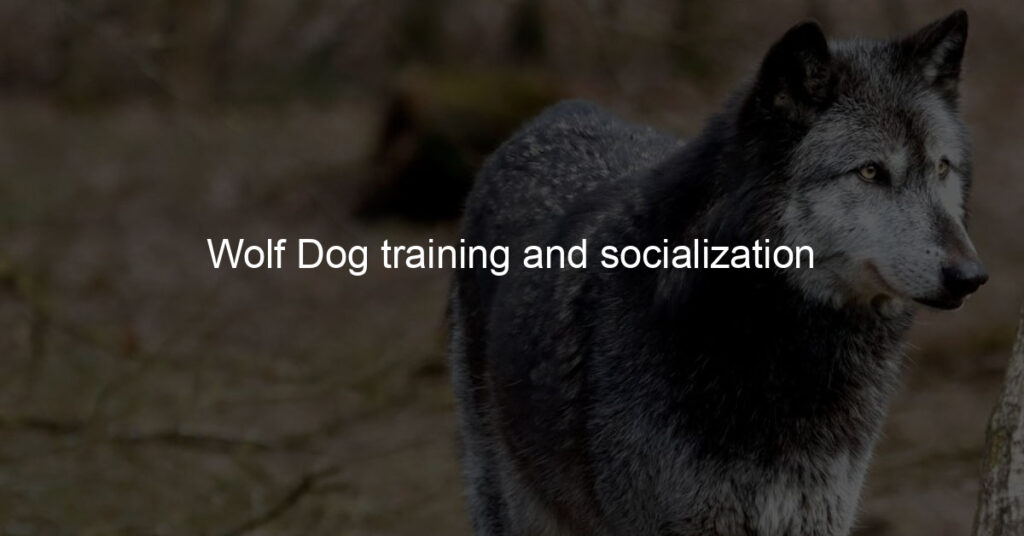Are you the proud owner of a wolf-dog? While these unique pets can be incredibly rewarding companions, they come with special considerations that owners need to know about. Wolf dogs can make excellent family pets, but their strong instincts and independent nature requires extra patience when it comes time for training and socialization.
Can wolfdogs be trained?
Wolfdogs can be trained, but it’s a challenge. Because wolfdogs are very intelligent and independent, they need to have patience and consistency when being taught new behaviors. Training wolfdogs is also a long-term process since they require frequent reinforcement of tasks to remember them.
Therefore, anyone looking to train a wolfdog must be willing to give the animal enough time for reinforcement and practice for successful results. Ultimately, it’s important to understand that every wolfdog is unique and may respond differently to training than their canine counterparts – you must acknowledge their wild side and embrace their instincts!
How do you get a Wolf Dog to respect you?
A resetting boundary is an important part of setting yourself as the pack leader when it comes to your Wolf Dog. It’s essential to maintain a calm and assertive demeanor when approaching and interacting with your pup. Establish clear, consistent rules, and enforce those rules consistently and with fairness.
Your Wolf Dog should understand that they cannot cross these boundaries, but if they abide by them they will have fun too – walking together, playing fetch, or going for a drive can provide great opportunities for bonding between you both. Being clear, steady, and consistent in rule-setting is key to establishing a trusting bond with your Wolf Dog, allowing them to respect you as their leader.
How do you train a Wolf Dog?
Wolf dogs can be complex and independent animals, so it is important to be aware of what you are getting yourself into before attempting to train one. Knowledge about the particular breed and its behaviors is key to creating a successful training plan.
It is beneficial to start with smaller steps such as basic training commands like sit, stay, come, and down. Consistency helps create lasting habits and clear expectations make for understanding between owner and pet. Positive reinforcement should also be implemented, like treats or praise.
It is easier to get results through positive reinforcement than through negative consequences. Patience should always be practiced as wolf dogs can take longer to learn certain commands than other common pet breeds. Training any animal requires commitment but when it comes to taming wolf-dog hybrids, being consistent with patience and positive reinforcement will pay off!
How do the socialization periods of dogs and Wolf dogs differ?
Wolf dogs, a hybrid of wolves and domestic dogs, differ significantly in their socialization periods compared to their more domesticated canine counterparts. Wolves are more independent, territorial, and aloof with others and their human families, whereas domesticated dogs require less independence, are less territorial, and bond strongly with those humans that take care of them.
As a result, wolf dogs require special attention when it comes to socializing as puppies and beyond for them to learn how to behave around people. Wolf dog owners must stay vigilant in establishing rules within the home environment from day one and spend an average of two hours per day engaging the pup in simple activities like playtime, obedience training, and car rides.
Though it may be more difficult to socialize a wolf-dog versus domesticated canine breeds, the effort is certainly worth it as they can easily become wonderful members of the family!
Can Wolf Dog be socialized?
Wolf dogs can still be socialized, even though they are a unique hybrid breed of dog. The key to finding success is understanding the nature of their wolf genetics and appreciating their wild side.
With patience, consistency, and a good trainer, any knowledgeable owner can create an even balance between the domesticated side of their pup and the tendency to return to its wolf instincts when upset or excited. Reinforcement-based training is essential; punishment-based training should always be avoided as it will only work against socializing the Wolf Dog.
For these pups to become used to people and other animals, consistent exposure and interaction must take place in early socialization classes – these classes often include playtime with peers, human interaction, desensitizing exercises, basic skills instruction, and more.
Do wolf dogs get along with dogs?
While wolf dogs can be lovable and intriguing animals, it is not always recommended to get them if you have other domesticated dogs in your home. Wolf dogs are wild at heart, and their behavior can rely heavily on instinct when faced with certain situations.
They act differently than trained domestic dogs, so conflict can arise between the two. While some wolf dog owners may report that their pet gets along with other family pets just fine, it is important to take every precaution before bringing a wolf hybrid into your home along with other domestic animals.
Conclusion
In closing, it is important to remember that the success of training and socializing wolf dogs depends largely on their environment and their level of consistency. Wolf dogs are incredibly intelligent creatures that can respond positively to the gentle guidance and consistent encouragement. Ultimately, investing in quality training for your wolf dog leads to better overall behavior and strengthens your relationship with them. With proper training, patience, and dedication, a strong bond between you and your wolf dog can be established that will last for many years. After all, at the end of the day, wolves are truly amazing animals that deserve to be respected and appreciated for their unique traits.








